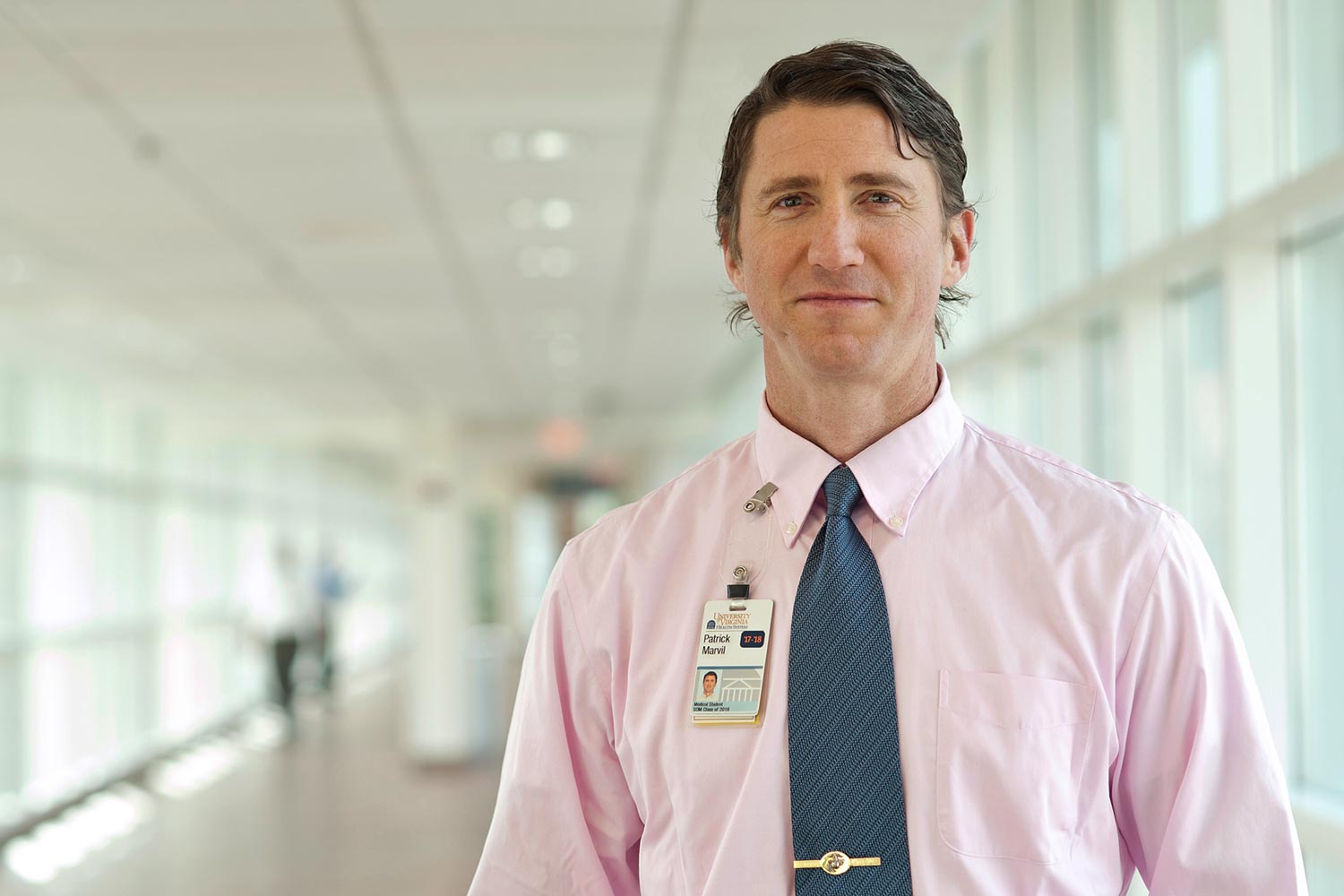Patrick Marvil, who will graduate May 20 from the University of Virginia’s School of Medicine, flew medical missions in Iraq and Afghanistan as a U.S. Marine helicopter pilot before coming to UVA.
Sitting at picnic tables outside of the UVA Medical Center’s cafeteria, Marvil recently discussed his time in the Marine Corps, sailing (partially) around the world and how he decided to become a doctor.

Q. You served in the Marine Corps. Where were you deployed?
A. I was a helicopter pilot for three deployments in Iraq, and I was on the ground for one tour in Afghanistan with Marine Special Operations.
In total, I was in the Marine Corps for nine years. It feels like a long time ago. I was on active duty from 2000 to 2009. While I was in flight school learning how to fly helicopters, 9/11 happened. And we invaded Afghanistan a month or two later. When I finished training, I went straight to Iraq.
Q. What were your duties in the Marines?
A. Most of the flying I did was casualty evacuation – medical evacuation is another term for it, as different services have different names. We were picking up wounded soldiers, sailors and Marines and flying them to a field surgical facility to be stabilized, then we’d fly them on to a higher-level hospital. Daytime and nighttime flying. Casualty evacuation probably accounts for over half of the flying I did overseas.
Q. Was that your first exposure to medical care?
A. That’s part of why I’m here, absolutely. When I decided I wasn’t going to fly anymore and decided to get out of the Marine Corps, that was part of the influence that led me to the medical field. The nurses, the doctors, and the corpsmen who I worked with – I always had at least two corpsmen with me in the back of my helicopter – were just phenomenal. I was executing a medical mission for a lot of my time in the military.
When I was flying, I really enjoyed flying. Pursuing medicine wasn’t on my mind at the time. I enjoyed being up front and piloting the aircraft. It wasn’t until after I got out that I decided my next career.
Q. Do you have any memorable stories from your time served?
A. One thing that stands out in my memory: I did a lot of night flying. And many times, that would turn into early morning flying. At night, I’d fly using night-vision goggles and then at first light, nautical twilight, I’d flip my goggles up and I’d see the sky go from pink to orange to yellow above the Iraq desert. Ending those long nights with a sunrise like that – that was very memorable. And at night, the stars are incredible in Iraq.
Another cool thing was just being in Iraq — the Fertile Crescent, the Cradle of Civilization. Flying over the Tigris and Euphrates rivers. Touring the ancient city of Babylon with an Iraqi archeologist. Flying over the city of Ur, and the marshes of southern Iraq. It was really spectacular.
Q. What did you do next?
A. When I got out, my wife was still in the Navy – she’s a civil engineer. She was finishing up her service in Bethesda, [Maryland,] building the Walter Reed National Military Medical Center.
After that was over, we took what we call our sabbatical: We fixed up an old 38-foot sailboat and went sailing for a couple of years.
Q. You sailed around the world?
A. That was our intent. You can sail around the world in a year or two. But it’s a lot of sailing, and not a lot of enjoying the places you stop. A few months into the trip, we realized two years would be too fast.
We met a British couple in North Carolina who were six years into their circumnavigation and they’d only made it from England to the East Coast of the United States. There was an Australian couple in Panama who were 15 years into their three-year circumnavigation. That’s the way it goes. People take 10, 12, 15 years to do it.
My wife and I realized that we were not at a stage in our lives to sail for 10 years. So, we reset our pace and where we’d end up. We went through the Panama Canal to the Pacific Ocean, and that was our decision point: Were we going to sail down to the Galapagos and the south Pacific, or would we turn around and head home? If we went to the South Pacific, we might not be home for a long time.
We wanted to start new careers and have a family, so we came home. It was a tough decision to make, but it’s worked out well. And the south Pacific is still waiting for us.
All told, we were on the boat for about two years. About 1 1/2 years of that was overseas; the other six months was going down and back up the East Coast of the U.S.
Q. What was your favorite thing about the trip?
A. Spending the time with my wife. Location-wise, my favorite spot was off the coast of Panama, on the Pacific side. Really wild islands. There were crocodiles. And the surf was good, the fishing was good. And it was so empty. Sitting on the boat at sunset, it looked like a dinosaur could walk out on the beach, like it was a setting for “Jurassic Park.”
Q. Were there any medical emergencies while underway?
A. No. We were set, though, with gear. I have an older brother who is a doctor, and – from my time in the Marine Corps – friends who were Special Operations medics. We had good support. They built us little kits and stocked us with supplies. We had a pretty robust medical bay on the boat which, luckily, we never had to use.
But it was a concern when you’re preparing for a trip. You have this vision of having to remove your own appendix out at sea, using a mirror, right?
Q. I’ve never had that vision, no.
A. There’s some Russian guy who performed surgery on himself. He was a solo sailor and was down off Antarctica in the Southern Ocean.
No, our goal was to not to get into medical emergencies, or any emergencies at all.
We took this trip when we were newly married. Prior to this trip, we were both in the service. She was deployed a lot and I was deployed a lot, so we’d spent a lot of time apart early in our relationship. During the trip, friends and family would visit us on the boat, but it was nice to have time when it was just the two of us.
Q. What made you want to be a doctor?
A. I have an older brother who is a doctor. When we came back from the sailing trip, I thought I knew what I was going to do: Go back into the military. I had a job lined up.
Then, one night, I had this late-night conversation with my brother. He said, “You’ve always been really interested in what I do. You should think about becoming a doctor.”
I was like, “There’s no way I’m going back to medical school for four years and go through all of that training. You’re crazy.”
The next morning, I woke and I said, “Hey, maybe I’ll become a doctor.”
When I told my wife, she said I was crazy. But then the idea grew on her, too. And now, here we are.
Q. Why did you choose UVA and Charlottesville?
A. The school really impressed me. The curriculum seemed really intelligent, and that they’d use my time well. The people I’d met here were impressive. It was a good fit.
Additionally, it was close to our families: my wife’s parents are in Waynesboro, my Mom is up in Northern Virginia.
Q. How do you think your skills from your “previous lives” will inform your practice?
A. What I hope is that the experience I have in life, with people, will help me in my interactions with patients and staff no matter where I work.
I have a commercial pilot’s license. At some point I’d like to fly again, because I’m rated in both helicopters and fixed-wing aircraft. I do miss flying sometimes. I have this vision of tying medicine into flying or vice versa. I was thinking of practicing in areas that are more rural or remote, where you need to fly into outlying clinics, or it made more sense to fly to get places.
I interviewed in Idaho for my residency, and there’s a family doctor up there who flies up to a clinic in the mountains every week or two. He works all day and then flies home.
Q. Where did you match?
A. My residency will be in family medicine at Kootenai Health in Coeur d’Alene, Idaho. Coeur d’Alene is about the size of Charlottesville, but it sits in the northern part of Idaho, which is very sparsely populated. There’s a lot of wilderness up there.
I thought that, as a family physician, the opportunities for training could be great and interesting. Up there, the family medicine residents get to do a little bit of everything. The hospital serves a huge area of all of northern Idaho and a little into both Montana and Washington.
One of the reasons I chose family medicine is because you can take it, essentially, anywhere in the world. I thought that could also open up adventures for the family down the road.
Q. What will you miss most about Charlottesville and UVA?
A. We’ve had a really nice time in Charlottesville and at UVA. I think Charlottesville is just a nice place to live. Having grown up in Virginia, my brothers and I would camp a lot, fish in the Shenandoah [National] Park and on the Potomac River. I’ll miss Virginia, the mountains and forests here. It’s in my blood.
It’s been a privilege for me to be here. The folks I met on the faculty and my fellow students are just – across the board – incredible people. It’s been a privilege for me to be a part of UVA’s School of Medicine. Honestly, it’s been a very humbling experience.
Media Contact
Article Information
May 1, 2018
/content/class-2018-med-evac-medical-doc-patrick-marvil-has-seen-lot

